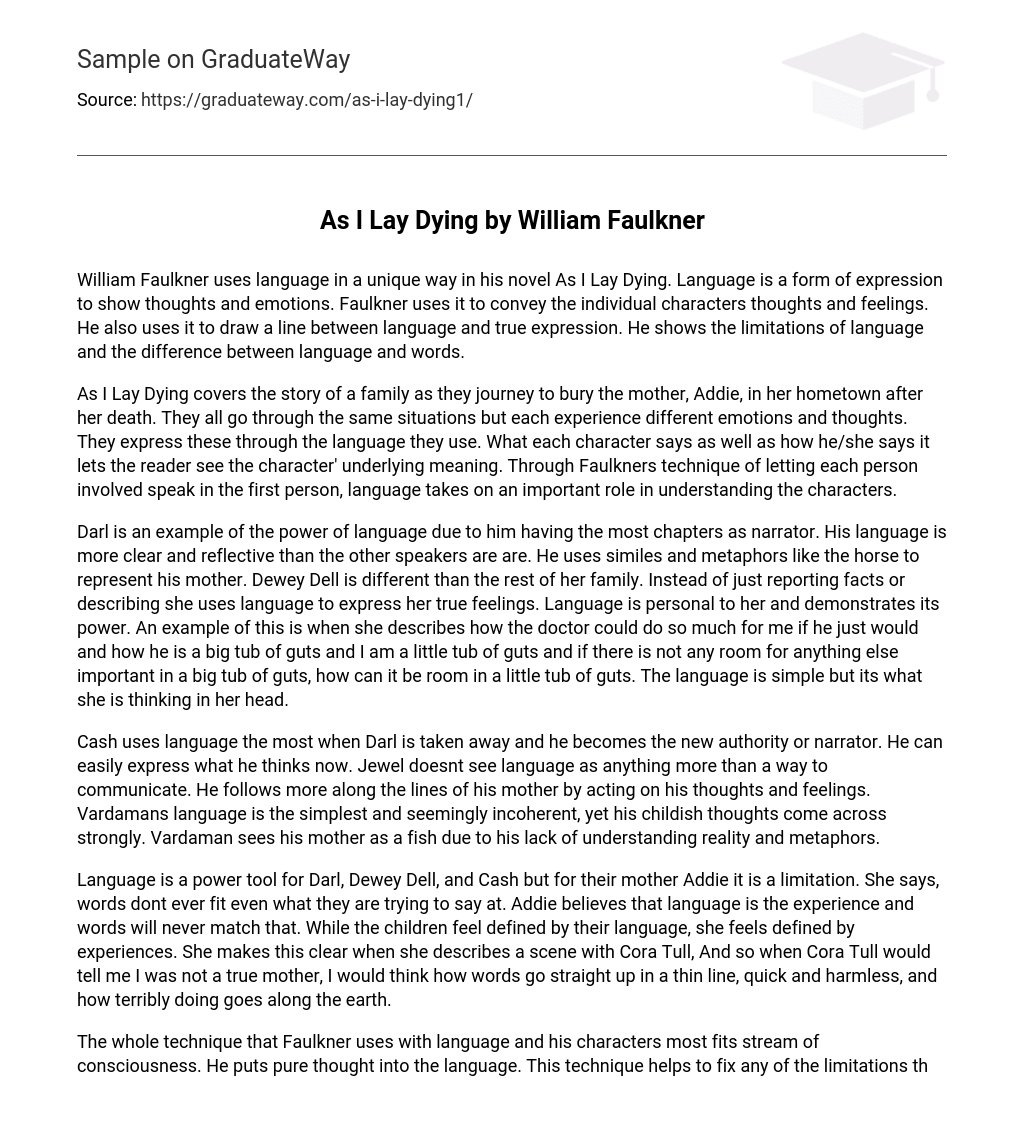In his novel As I Lay Dying, William Faulkner employs a distinctive approach to language. Language serves as a means of revealing thoughts and emotions, allowing Faulkner to convey each character’s individual state of mind. Furthermore, he utilizes language to establish a distinction between mere linguistic expression and genuine emotional expression. Faulkner illustrates the limitations inherent in language and underscores the disparity between language and words.
As I Lay Dying revolves around a family’s quest to bury their deceased mother, Addie, in her hometown. Despite experiencing the same events, each family member has unique emotions and thoughts, which they convey through their language. The way in which each character expresses themselves not only reveals their individual perspectives but also aids in understanding their true intentions. By employing Faulkner’s technique of allowing each character to speak in the first person, language becomes a significant tool in comprehending the characters.
Darl exemplifies the power of language by being the narrator for the majority of chapters. Unlike the other speakers, his language is clear and introspective. He employs similes and metaphors, such as comparing his mother to a horse. Dewey Dell stands out within her family as she uses language not only to convey information but also to express her true emotions. Language holds personal significance for her, revealing its potency. For instance, she depicts how the doctor has the capability to help her, but chooses not to, describing him as a large tub of guts while she is a small tub of guts. This simple language reflects her thoughts.
Cash utilizes language most prominently when Darl is removed and he assumes the role of the new authority or narrator. He is now able to effectively convey his thoughts. Jewel, conversely, views language merely as a means of communication. Similar to his mother, he acts based on his thoughts and emotions rather than articulating them. Vardaman’s language is the most basic and appears incoherent, yet his childlike thoughts are conveyed powerfully. Due to his limited grasp of reality and metaphors, Vardaman perceives his mother as a fish.
Language is a powerful tool for Darl, Dewey Dell, and Cash, but it limits their mother Addie. She expresses that words never accurately convey what they are trying to express. Addie believes that language is merely a reflection of experiences, and can never fully capture those experiences. In contrast to her children, who feel defined by language, Addie feels defined by her lived experiences. She emphasizes this point when she recounts a scene with Cora Tull, remarking how words can easily and harmlessly float in the air, while actions have a tangible impact on the world.
Faulkner’s use of language and his portrayal of characters align best with the stream of consciousness technique. He effectively captures pure thought through his language, thereby overcoming the limitations imposed by language in expressing thoughts. This is evident through Vardaman, whose language abilities are not fully developed. Vardaman’s almost perplexing and sporadic comments vividly depict the extreme application of stream of consciousness. Yet, these comments offer insight into Vardaman’s perspectives, with words serving as a tool for readers to access the character’s mind.
Faulkner sometimes goes beyond the limitations of words to express thoughts and feelings in his work. This is shown through the use of non-existent words, metaphors, and similes by the characters. An example of this is when Faulkner leaves a blank space in a dialogue where no word can adequately describe a certain concept. Similarly, Faulkner includes a picture in the middle of a dialogue when Tull struggles to find a word to describe the casket being made by Cash. These instances of unconventional language usage provide readers with insight into the characters’ minds.
In As I Lay Dying, Faulkner’s use of language surpasses restrictions by employing a distinctive style compared to other novels. This technique enables him to directly convey the thoughts of each character while staying true to their individual thought patterns. Consequently, language transcends mere words and delves into the essence of the human spirit and existence.
Bibliography:





